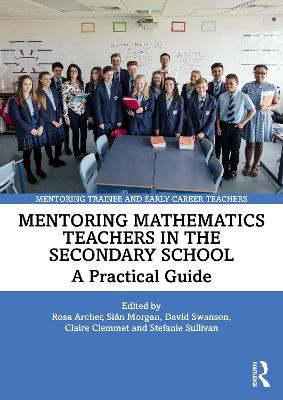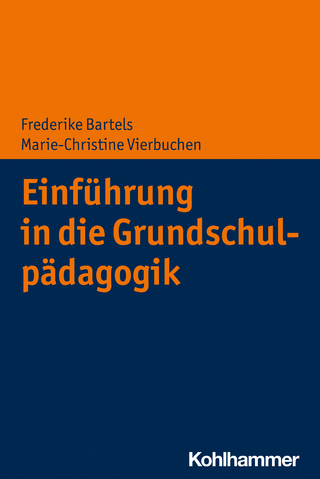
Mentoring Mathematics Teachers in the Secondary School
Routledge (Verlag)
978-0-367-36137-2 (ISBN)
Together with analytical tools for self-evaluation, this book is a vital source of support and inspiration for all those involved in developing the next generation of outstanding mathematics teachers, whether in teacher training or as newly qualified or early-career teachers. Key topics explored include:
Roles and responsibilities of mentors within mathematics education, and understanding yourself as a mentor
The mentor–mentee relationship, and helping develop a beginning teacher’s identity
Supporting specific aspects of beginning mathematics teachers’ knowledge, skills and understanding, including developing reflective practice, lesson planning and mathematical misconceptions
Strategies for observation and analysis of lessons, marking, assessment and the use of data
Mentoring for long-term career and teacher development
Filled with the key tools needed for the mentor’s individual development, Mentoring Mathematics Teachers in the Secondary School offers an accessible and practical guide to mentoring trainee teachers and early-career teachers with ready-to-use strategies that support, inspire and elevate both mentors and teachers alike.
This book also includes an online eResource offering downloadable resources and web-based training material.
Rosa Archer is the Programme Director for the PGCE Secondary at the University of Manchester, UK. Rosa taught mathematics for many years in schools, sixth-form colleges and universities. Her research interests include lesson study and critical pedagogies on mathematics. Rosa has a passion for teaching and learning mathematics as well as inclusion and sustainability within the curriculum. Recent publications include Understanding lesson study for mathematics: A Practical Guide for Improving Teaching and Learning, Myths and Legends of Mastery in the Mathematics Curriculum: Enhancing the Breadth and Depth of Mathematics Learning in Primary Schools and The Mathematics Practitioner’s Guidebook for Collaborative Lesson Research: Authentic Lesson Study for Teaching and Learning. Siân Morgan has had a 30-year career in education. She is a Senior Lecturer at the University of Manchester, UK, working for over 10 years in initial teacher education. In 2020, she co-authored a book Understanding Lesson Study for Mathematics: A Practical Guide for Improving Teaching and Learning. Her current research interests continue to focus on lesson study, professional development and mathematical pedagogy, alongside a particular passion to develop equality, diversity and inclusion and sustainability within the curriculum (social and environmental justice). David Swanson taught mathematics for many years and now teaches the PGCE Secondary Mathematics course at the University of Manchester, UK. He also researches at the university, particularly on mathematical and pedagogical concept development and critical social perspectives on education. Recent co-authored books and articles include Understanding Lesson Study for Mathematics: A Practical Guide for Improving Teaching and Learning and Photojournalism and the Moss Side Riots of 1981. His latest project investigates school-student strikes against racism in the 1980s. Claire Clemmet is an experienced maths teacher and mentor who has been working as a teacher educator at the University of Nottingham, UK, since 2010. During this time she has worked on a range of ITE courses and is now the subject lead for the PGCE Secondary Mathematics course. Claire is currently completing her educational doctorate, which focuses on the role mentors play in the subject knowledge development of student teachers. Stefanie Sullivan is Deputy Head of the School of Education at the University of Nottingham, UK. Stef joined Nottingham as an experienced mathematics teacher and professional development consultant and now has over 20 years of experience of Initial Teacher Education. Stef is particularly interested in how Initial Teacher Education programmes, and the mentors who work with beginning teachers, develop confident professionals who can be successful teachers in a range of different contexts.
Chapter 1 Models of Mentoring
Chapter 2 The role of mentoring when learning through experience
Chapter 3 Why Mentoring
Chapter 4 Developing Reflective Practice
Chapter 5 Understanding yourself as a mathematics mentor
Chapter 6 Exploring the knowledge a mathematics mentor needs
Chapter 7 Navigating the roles and responsibilities of a maths mentor
Chapter 8 Supporting your beginning teacher
Chapter 9 Observing a lesson
Chapter 10 Effective professional dialogue
Chapter 11 Developing a Mentoring Mathematics Department
Chapter 12 The Building Blocks
Chapter 13 Mathematical Misconceptions
Chapter 14 Developing Lesson Planning
Chapter 15 Teaching the Lesson
Chapter 16 Developing understanding of assessment, marking and the use of data
Chapter 17 Handing the baton on
| Erscheinungsdatum | 05.12.2023 |
|---|---|
| Reihe/Serie | Mentoring Trainee and Early Career Teachers |
| Zusatzinfo | 4 Tables, black and white; 13 Line drawings, black and white; 1 Halftones, black and white; 14 Illustrations, black and white |
| Verlagsort | London |
| Sprache | englisch |
| Maße | 174 x 246 mm |
| Gewicht | 370 g |
| Themenwelt | Mathematik / Informatik ► Mathematik |
| Sozialwissenschaften ► Pädagogik ► Schulpädagogik / Sekundarstufe I+II | |
| ISBN-10 | 0-367-36137-X / 036736137X |
| ISBN-13 | 978-0-367-36137-2 / 9780367361372 |
| Zustand | Neuware |
| Informationen gemäß Produktsicherheitsverordnung (GPSR) | |
| Haben Sie eine Frage zum Produkt? |
aus dem Bereich


